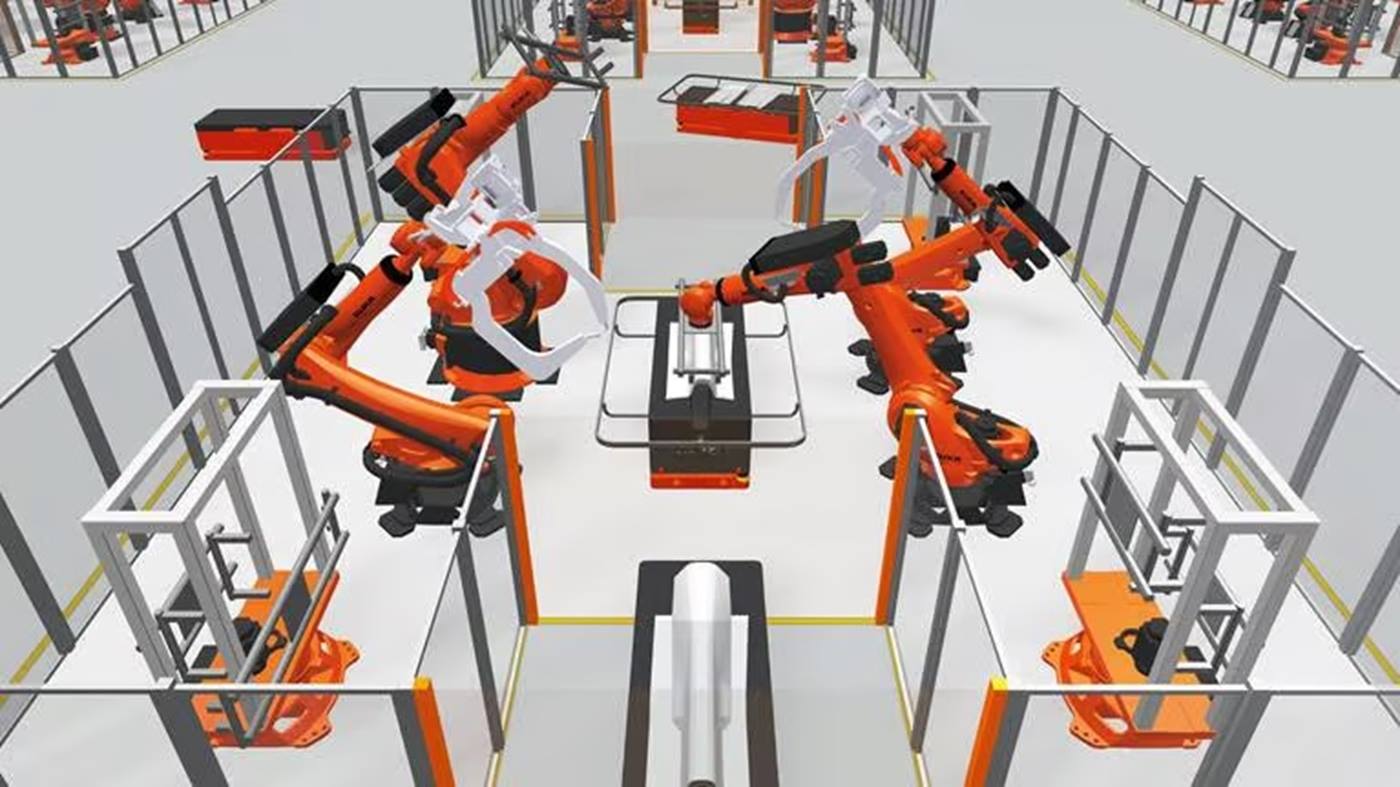
Artificial intelligence in industrial automation and manufacturing
KUKA uses artificial intelligence in its own products and solutions. There is always one goal for all of this: making automation easier for our customers. Artificial intelligence (AI) is changing the world. AI automation is at the heart of this transformation, reshaping the industrial automation landscape worldwide. This also applies to automation in global production halls, workshops, hospitals, and warehouses.
AI in robotics: making automation simple
With AI manufacturing progressing, many technical possibilities are being realized today. The question is often: Where does it make sense to use them? Where does AI in manufacturing add value? KUKA is refining AI manufacturing within robotics to enhance our processes and integrate intelligent systems. At KUKA, artificial intelligence is not an end in itself.
AI automation makes systems more flexible. AI-powered systems in manufacturing allow for real-time adjustments to enhance production quality. To maximize customer benefits, we leverage intelligent automation opportunities: AI enables process automation at every manufacturing stage.
AI solutions from manufacturing processes to logistics systems
Artificial intelligence in robot programming
AI automation is revolutionizing industrial robotics by making robot programming more accessible to a broader range of employees. Traditionally, programming robots has been a task reserved for experts familiar with complex robot languages. To change this, KUKA is developing iiQWorks.Copilot, an AI-driven chatbot that translates natural language commands into executable robot code. This innovation allows users to simply describe tasks—like “pick up boxes from the conveyor belt and palletize them”—and receive a fully functional robot program within minutes. However, directly testing AI-generated code on physical robot controllers still poses risks, a concern widely acknowledged across the industry. That’s where virtual simulations come in. KUKA leverages digital twins to validate and optimize robot behavior in virtual environments before deployment. This not only ensures safety but also significantly reduces commissioning time.


KUKA leverages AI systems to optimize the master control of autonomous mobile robots (AMRs).
KUKA effectively makes use of AI systems in the master control of autonomous mobile robots (AMRs), ensuring that transport orders are intelligently distributed across the fleet for maximum efficiency. With the AI-driven KUKA.AMR software, production systems are streamlined by reducing the number of AMRs needed—without compromising performance.
The software enables real-time traffic and job management, even in complex environments with dynamic obstacles. Thanks to no-code programming and drag-and-drop configuration, logistics processes can be set up quickly and intuitively. Whether managing KUKA robots or third-party vehicles, AI automation through KUKA.AMR ensures seamless integration and optimized material flow.

ItemPiQ from Swisslog

kAIsa - KUKA's AI-supported sales agent
The kAIsa is an intelligent sales assistant that supports our customers on the my.KUKA platform also integrates AI models that predict user needs based on interaction. It recommends customized simulation products for various robot applications based on the entries made by the user. This helps the customer find what he is looking for more quickly. The chatbot also helps to make sales processes more efficient and specific.

KUKA Xpert AI Assistant: The chatbot for KUKA's knowledge database
KUKA Xpert is KUKA’s central knowledge database. Artificial intelligence tools aid in analyzing vast amounts of data to improve decision-making processes. It includes customer and service documentation in addition to general product and programming information.
A chatbot supports the search in Xpert. The AI Assistant searches through 1.6 million pieces of product information, documentation and solution data and provides answers to your questions within seconds. This AI adoption in customer service exemplifies how generative AI can transform traditional business practices. This saves you time when researching and improves your customer service when answering customer queries.

KUKA.SmartBinPicking: Recognizing, structuring and gripping objects
KUKA.SmartBinPicking is an advanced software solution specially developed for the automated picking of unsorted components from a crate. Integrating AI-based object recognition optimizes automated processes in manufacturing. The software can recognize and prioritize the gripping points of the objects, which significantly improves the efficiency and precision of bin picking by using neural networks.

Using AI responsibly: potential of the digital transformation
AI and digital transformation unlock potential across industrial landscapes worldwide. Incorporating AI offers strategic growth and a competitive edge in manufacturing industries. Integrating the AI models into processes in accordance with the high safety requirements of the automation industry is what applies here. At the same time, we see it as our corporate responsibility to handle these technologies and the resulting data responsibly.
We hold science-backed confidence that AI will positively transform manufacturing's future. Driving our enterprise forward, we aim to employ AI to transform business operations responsibly. This ensures we meet our standards as well as those of our customers and society. Our goal is to create trust in handling digital technologies.
Technological innovation through strategic partnerships

AI plays an important role in our technologies. Strategic partnerships are very important here, as they bring together expertise from a wide variety of areas. This increases speed and promotes innovation.
Opinions on AI from the KUKA Group
Questions to answer regarding AI in Automation and Manufacturing
What is Artificial Intelligence in Manufacturing?
Artificial Intelligence (AI) in manufacturing refers to the use of intelligent algorithms and machine learning to optimize production processes, improve quality, and increase efficiency. AI enables machines and systems to analyze data, learn from it, and make decisions—often in real time.
Key applications include:
- Predictive maintenance: AI analyzes sensor data to predict when machines will need repairs, reducing downtime.
- Quality control: Computer vision systems detect defects faster and more accurately than human inspectors.
- Process optimization: AI continuously adjusts production parameters to improve output and reduce waste.
- Robotics and automation: AI-powered robots can adapt to new tasks, collaborate with humans, and even be programmed using natural language, as seen in KUKA’s new iiQWorks.Copilot assistant.
- Digital twins: Virtual models of machines or entire production lines simulate and test changes before they’re implemented in the real world.
In short, AI transforms manufacturing into a smarter, more flexible, and more resilient industry.
Can AI help non-experts program industrial robots?
Yes, AI is making robot programming more accessible than ever. Traditionally, programming industrial robots requires specialized knowledge of complex robot languages. KUKA is changing that with iiQWorks.Copilot, an AI-driven chatbot that translates natural language commands into executable robot code.
Users can simply describe tasks—like “pick up boxes from the conveyor belt and palletize them”—and receive a fully functional robot program within minutes. This democratizes robotics, allowing more employees to contribute to automation without needing deep technical expertise.
How can AI chatbots improve customer service in manufacturing?
AI chatbots significantly enhance customer service by providing fast, accurate, and personalized support. For example, KUKA Xpert AI Assistant searches through over 1.6 million pieces of product information, documentation, and solution data to deliver instant answers to customer queries.
Similarly, kAIsa, KUKA’s intelligent sales assistant, predicts user needs and recommends tailored solutions based on interactions. These AI tools reduce response times, improve customer satisfaction, and streamline sales and support processes—making service more efficient and user-friendly.






